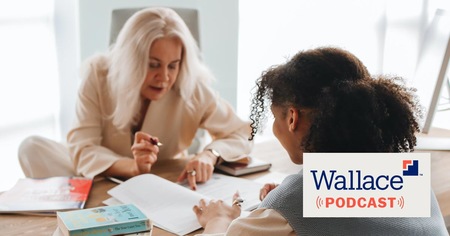Let's look at the funding status of a few key federal programs that support SEL through after-school and summer learning programs, as well as recent federal legislation.
Federal Funding for SEL and After-School Care
On the top of Congress' agenda will be passing fiscal year 2020 spending bills. The House of Representatives passed all twelve of their spending bills earlier this year. The Senate waited on a budget deal, now signed into law, and will likely start by reviewing the labor, health and human services, and education appropriations proposed in H.R.2740.
Although the Senate will likely have fewer funds to work with than the House did for H.R.2740, it's useful to take a look at the House's funding levels for a few key funding streams that support SEL, both in and out of school:
- 21st Century Community Learning Centers: Current funding level is $1.222 billion; the proposed House level: $1.322 billion—which is a $100 million increase. Through a competitive funding process in each state, this money funds local school- and community-based afterschool and summer learning programs that focus on positive youth development and SEL.
- Title IV Full-Service Community Schools: The House bill provides $40 million, an increase from $17.5 million, to provide comprehensive services and expand evidence-based models that meet the holistic needs of children, families and communities.
- Title IV Student Support and Academic Enrichment (SSAE) Grants: The proposed $1.3 billion marks an increase of $150 million above the 2019 level. SSAE funds, established under the Every Student Succeeds Act (ESSA), support activities that provide students with a well-rounded education, ensure safe and supportive learning environments, and use technology to improve instruction.
- Career, Technical Education (CTE): $1.3 billion, an increase of 3 percent, would go to implementation of the Perkins V CTE legislation that passed last year, focusing on employability skills.
The House bill also funds programs that address SEL within the Department of Health and Human Services and other agencies:
- Child Care and Development Block Grant: $7.7 billion, an increase of $2.4 billion. In addition to supporting childcare for children up to age five, the funds go to afterschool programs that focus on health and safety for nearly a million children.
- Community Services Block Grant: $760 million, an increase of $35 million. These funds can be used by local jurisdictions to support a number of programs including afterschool and youth development efforts.
- Teen Pregnancy Prevention Program: $110 million, an increase of $9 million above the fiscal year 2019 level. This evidence-based program supports afterschool pregnancy prevention programs.
- Various mental health resources for children and youth, including $84 million for Project AWARE, an increase of $13 million and $71 million for the National Child Traumatic Stress Initiative, an increase of $7 million.
- Corporation for National and Community Service: $1.14 billion, an increase of $55 million above the 2019 level. This group supports AmeriCorps and VISTA, which are key assets for hundreds of afterschool SEL programs.
- Youth Mentoring Initiative: $100 million to increase opportunities for youth to have mentors and improve the quality of the mentoring they receive.
Of note, the bill provides $260 million for an initiative to support SEL and "whole child" approaches to education. The bill provides:
- $170 million within the Education Innovation and Research program to go toward grants for evidence-based, field-initiated innovations that address student social, emotional and cognitive needs.
- $25 million within the Supporting Effective Educator Development (SEED) grant program, for teacher professional development and pathways into teaching that provide a strong foundation in child development and learning, including skills for implementing SEL strategies.
- $25 million within the School Safety National Activities program to make schools safer through a new competition that will help local educational agencies directly increase the number of mental health and child development experts in schools. The $40 million for community schools is also included in the SEL initiative.
Advocates are working to support these priorities in the Senate bill—and in any negotiation that occurs between House and Senate versions of the Labor, Health and Human Services, and Education appropriations bill.
To learn more about federal legislation on social and emotional learning and out-of-school time and how you can add your support, read the full article on the Committee for Children blog.
Written by Jordan Posamentier, director of policy and advocacy, Committee for Children, and Erik Peterson, vice president of policy, Afterschool Alliance.
Photo courtesy of Committee for Children.




